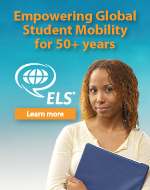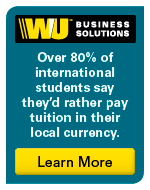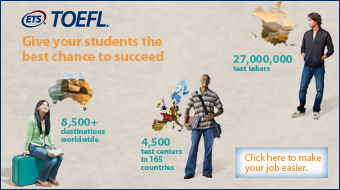
| IIE Home | Membership | Publications | Open Doors | Contact Us | Subscribe |
|
||||||||||||||||
|
||||||||||||||||
|
News
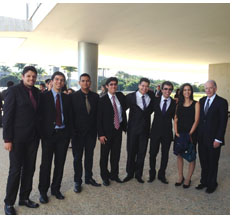 At a ceremony at the Palácio do Planalto in Brasilia, Brazilian president Dilma Roussef announced plans to launch a second stage of the Ciência sem Fronteiras Scholarship program (known in the United States as the Brazil Scientific Mobility Program). Second stage would offer opportunities to 100,000 additional Brazilian students. "This program was created to guarantee conditions to generate new innovation here, to generate interests in the sciences and through the application of technology in all areas," the president explained. At a ceremony at the Palácio do Planalto in Brasilia, Brazilian president Dilma Roussef announced plans to launch a second stage of the Ciência sem Fronteiras Scholarship program (known in the United States as the Brazil Scientific Mobility Program). Second stage would offer opportunities to 100,000 additional Brazilian students. "This program was created to guarantee conditions to generate new innovation here, to generate interests in the sciences and through the application of technology in all areas," the president explained.IIE president Allan E. Goodman traveled to Brazil to attend the ceremony and meet with the Brazilian Government about the program, which IIE administers in the United States. "We are very grateful for the role that the U.S. colleges and universities have played in the success of the Brazil Scientific Mobility Program," Dr. Goodman commented. "The host campuses have shown great flexibility in working with us to accommodate the rapidly growing numbers of students from Brazil over the past three years." Dr. Goodman also shared about his trip a recent blog post "Letter from Brasilia: What 100,000 New Scholarships Mean for Brazilian and U.S. Students."
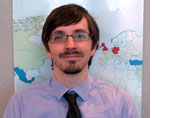 James King, Senior Research & Program Officer at IIE Scholar Rescue Fund, shares about a recent trip to Turkey to meet with Syrian refugees whose university education and academic work had been interrupted indefinitely due to the conflict in their homeland. "We simply cannot afford to let these future leaders of Syria fall through the cracks" writes King. "With this, the greatest educational crisis in the world today, the stakes are too high." James King, Senior Research & Program Officer at IIE Scholar Rescue Fund, shares about a recent trip to Turkey to meet with Syrian refugees whose university education and academic work had been interrupted indefinitely due to the conflict in their homeland. "We simply cannot afford to let these future leaders of Syria fall through the cracks" writes King. "With this, the greatest educational crisis in the world today, the stakes are too high.".jpg) Chad Goeden writes for NAFSA about Rajika Bhandari’s plenary address for NAFSA’s 2014 Online Conference on "big data." Bhandari, Deputy Vice President of Research and Evaluation at IIE, challenged participants "to think critically about how 'big data' can positively impact their work as international educators," writes Goeden. "[Bhandari] brought to life the ways that institutions and campuses can successfully strategize about their decisionmaking processes by understanding and incorporating "big data" into conversations about context, benchmarking, and campus advocacy." Chad Goeden writes for NAFSA about Rajika Bhandari’s plenary address for NAFSA’s 2014 Online Conference on "big data." Bhandari, Deputy Vice President of Research and Evaluation at IIE, challenged participants "to think critically about how 'big data' can positively impact their work as international educators," writes Goeden. "[Bhandari] brought to life the ways that institutions and campuses can successfully strategize about their decisionmaking processes by understanding and incorporating "big data" into conversations about context, benchmarking, and campus advocacy.""Black students made up 15 percent of the total college student population enrolled in the fall of 2011, but represented just 5.3 percent of students who went abroad that school year," reports Allie Bidwell in an article in U.S. News and World Report about the barriers to study abroad. She shares ways that colleges and universities are increasing access and highlights Kent State University’s pilot program to encourage study abroad among "minorities or those from low-income families who might not have had the opportunity to go overseas otherwise."
Kumud Ravisankaran wrote on Campus Diaries about his attendance at the Women Enhancing Technology (WeTech) Inauguration Day where high school girls in Bangalore pitched their ideas for a mobile app to address problems in their community. Over the course of twelve weeks, each team of girls will connect with a leader from Goldman Sachs or Qualcomm to develop these ideas and design the app. "Their ideas were backed up with so much research that I found it hard to believe that this was not the work of professionals," writes Ravisankaran. "Moreover I was impressed by the enthusiasm of girls and by the incredible support shown by their teachers and parents apart from the dedication shown by the mentors." Women Enhancing Technology (WeTech) is a consortium of dedicated partners that has joined IIE to design and support a series of innovative activities to provide training, build networks and offer professional opportunities.
Conferences
February 15-18, 2015 | Washington, DC
Proposal Deadline: August 15, 2014 | Proposal and Conference Details
The Association of International Education Administrators (AIEA) has released a call for proposals for the 2015 AIEA Conference. All session proposals should be targeted to Senior International Officers (SIOs) and relevant to the 2015 theme, "Leading Global Learning: Envisioning New Paradigms."
The following subthemes for the 2015 conference are strongly encouraged:
Deadlines
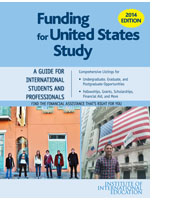 Deadline: August 1, 2014 | Update/Add Your Listing Today Deadline: August 1, 2014 | Update/Add Your Listing TodayThe Institute of International Education is currently preparing the 2015 edition of its annual directory Funding for United States Study: A Guide for International Students and Professionals, the print companion to IIE's online search engine www.FundingUSstudy.org.
With more than 1,000 grant and scholarship listings, Funding for United States Study is the most comprehensive directory on locating funding for study in the United States. It features detailed descriptions of grants, fellowships, and scholarships for undergraduate and graduate study, and doctoral and postdoctoral research in the United States. All basic listings are free of charge and provide an excellent opportunity to publicize your institution's programs.
How to Update/Add Scholarship Listings:
For institutions whose listings appeared in the previous year's directory, we ask that you verify and update your listings and contact information or add new listings.
Institutions whose listings did not appear in previous years' directories can add scholarships or grants that are available for international students.
Funding for United States Study is a trusted resource for international students seeking study in the United States. It's proven to be an effective forum to showcase U.S. campuses to this community. Advertisers include community colleges, public and private universities, and undergraduate and graduate programs, many of which may be recruiting the same type of students your institution seeks. Rates are affordable and some prime positions remain. For additional details, contact Jeff Bunkin at Naylor, LLC, at 352.333.3342 or via email at jbunkin@naylor.com.
With questions, please contact jgrosh@iie.org.
Fulbright
 The deadline to apply to the Core Fulbright U.S. Scholar Program is Friday, August 1st. The program offers nearly 600 awards in over 125 countries in teaching, research or combination teaching/research awards for college and university faculty and administrators as well as for professionals, artists, journalists, scientists, lawyers, independent scholars and many others. The deadline to apply to the Core Fulbright U.S. Scholar Program is Friday, August 1st. The program offers nearly 600 awards in over 125 countries in teaching, research or combination teaching/research awards for college and university faculty and administrators as well as for professionals, artists, journalists, scientists, lawyers, independent scholars and many others.A few highlights in Sub-Saharan Africa include: All Disciplines awards in Benin, Guinea, and Zimbabwe; Public Health opportunities in the Democratic Republic of Congo; and a Business Administration award in Swaziland. East Asia and the Pacific offers a Postdoctoral China Studies award in Hong Kong, U.S.-Korea Alliance Studies award in Korea, a study of the U.S. Distinguished Lecturing award in the Philippines, and All Disciplines awards in Malaysia and Cambodia. A sample of awards in Europe and Eurasia include: STEM opportunities in the United Kingdom, Finland, Austria, and Greece; a Slovak Republic award in American Studies; International Affairs grants in Hungary; a Business Administration award in Ireland; All Disciplines awards in the UK, Albania, and Belarus; and opportunities for scholars in Communication, Journalism and Media in Bulgaria. Middle East and North Africa features a number of interesting possibilities, including an American Studies award in the Palestinian Territories and Business and Economics opportunities in Bahrain. Jordan also offers a Business and Economics award, as well as opportunities in Cultural Preservation and Heritage and the Study of Islam in the Contemporary World. India offers the largest number of grants worldwide, with many All Discipline awards. Other highlights in South and Central Asia for All Discipline awards include the Maldives and the Central Asian republics—Kazakhstan, Kyrgyz Republic, Tajikistan, Turkmenistan, and Uzbekistan—which provide vast opportunities for individuals in an array of fields. Opportunities for scholar specializing in Science and Technology are plentiful in the Western Hemisphere, with awards offered in many countries, including Argentina, Brazil, Chile, Colombia, Ecuador, and Mexico. Colombia also offers opportunities in Biodiversity and Sustainable Development. Suriname is an intriguing destination, offering awards in All Disciplines. In addition, there are Teaching English as a Foreign Language (TEFL) opportunities available in all world regions. View all award offerings, visit our catalog of awards. To apply, click here. The Fulbright Program, sponsored by the U.S. Department of State’s Bureau of Educational and Cultural Affairs, is the U.S. government’s flagship international exchange program and is supported by the people of the United States and partner countries around the world. For more information, visit eca.state.gov/fulbright. Partnerships
Deadline: November 3, 2014 | Application and Proposal Details
The United States-India Educational Foundation (USIEF) announced an open competition for the support of projects through the Obama-Singh 21stCentury Knowledge Initiative (OSI). OSI aims to strengthen collaboration and build partnerships between American and Indian institutions of higher education. Accredited U.S. post-secondary educational institutions meeting the provisions described in Internal Revenue Code section 26 U.S.C. 501c(3) may submit proposals to support the program’s goals of encouraging mutual understanding, facilitating educational reform, fostering economic development, and engaging civil society through academic cooperation with Indian post-secondary educational institutions.
Exchange activities may include but are not limited to curriculum design, research collaboration, team teaching, focused series of exchanges, seminars, among other activities. Activities should be designed to develop expertise, advance scholarship and teaching, and promote long-term ties between partner institutions.
Proposals in the following fields are eligible: Energy, Climate Change & Environmental Studies; Education & Educational Reform; Public Health; Sustainable Development & Community Development; and International Relations & Strategic Studies.
Study Abroad
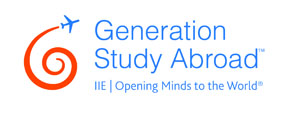 Survey Deadline: July 31, 2014 | Complete Online Survey Deadline: July 31, 2014 | Complete OnlineBe a part of Generation Study Abroad! Help us engage K-12 educators and their students to build global awareness and to develop interest in study abroad in the future. We value your input and would be grateful if you would take a moment to give us your suggestions on this survey as we plan our outreach to educators.
In early March, the Institute of International Education (IIE) launched Generation Study Abroad, a five-year initiative that brings leaders in education, business, and governments together to double the number of U.S. college students studying abroad. IIE has already identified more than 300 lead partners who have committed to specific, measurable actions that will help reach this ambitious goal; the result will be thousands more American students graduating with the international experience necessary for success in a globalized world.
To be successful, we recognize that it is very important to begin reaching out to students at a younger age, to help create a pipeline of students who plan to study abroad when they are in college. In the coming months, IIE will work with several organizations who work in the K-12 arena, such as National Geographic, the College Board, the American Council on the Teaching of Foreign Languages (ACTFL), and OneWorld Now!, to reach out to teachers across the country. We are setting a target to identify at least 1,000 high school teachers who will pledge to make their students aware of study abroad, and we will develop materials to help them.
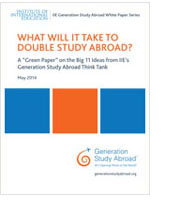 The outcomes from IIE’s Generation Study Abroad Think Tank, have been documented in the IIE green paper, "What Will it Take to Double Study Abroad?" This paper lays the foundation for an ongoing discussion around how to increase the number of students studying abroad in the short term and to shift the paradigm over the long term. We encourage you to share your insights and best practices with the community by commenting on the 11 Big Ideas outlined in the paper. The outcomes from IIE’s Generation Study Abroad Think Tank, have been documented in the IIE green paper, "What Will it Take to Double Study Abroad?" This paper lays the foundation for an ongoing discussion around how to increase the number of students studying abroad in the short term and to shift the paradigm over the long term. We encourage you to share your insights and best practices with the community by commenting on the 11 Big Ideas outlined in the paper.Idea 8: Provide incentives to all stakeholders who stand to gain by expanding study abroad
Incentives for students, faculty and many private sector players can help to expand study abroad. Identifying who stands to gain and developing creative means to incentivize them could involve them at an earlier stage in the process.
Share your insights and best practices on this topic: Submit a comment on our blog.
Scholar Rescue Fund
Applications Deadline: August 1, 2014 | Application and Fellowship Details
 The Institute of International Education's Scholar Rescue Fund (IIE-SRF) announces an August 1 deadline for its next round of applications from scholars facing threats to their lives or academic work. Fellowships support temporary academic positions at colleges, universities, and other research institutions outside the scholars' home countries anywhere in the world. The Institute of International Education's Scholar Rescue Fund (IIE-SRF) announces an August 1 deadline for its next round of applications from scholars facing threats to their lives or academic work. Fellowships support temporary academic positions at colleges, universities, and other research institutions outside the scholars' home countries anywhere in the world. IIE-SRF formalizes an unwavering commitment to preserve the lives, voices, and ideas of scholars around the globe. Since IIE-SRF's founding in 2002, the program has provided academic fellowships to scholars from 50 countries, placing them at over 300 host partner institutions in 40 countries.
Who can apply:
Professors, researchers, and public intellectuals from any country, field, or discipline may apply. Please refer eligible candidates and forward this announcement to any academic colleagues who may be interested.
Students or professionals seeking funding to pursue academic studies or training are not eligible.
How IIE's Scholar Rescue Fund works:
IIE-SRF fellowships support visiting academic positions for up to one calendar year. Awards are issued for up to US $25,000, plus individual health insurance coverage and professional development assistance.
Fellowships are disbursed through dedicated host academic institutions, which provide direct support and a safe haven for IIE-SRF fellows. In most cases, hosts are asked to match the IIE-SRF fellowship award by providing salary or stipend support and other in-kind assistance that would make the scholar's appointment comparable to other visiting academic positions. Please note that applications are accepted at any time and can be considered on an emergency basis.
|
| www.iie.org/iienetwork • Member website of the Institute of International Education © 2025 Institute of International Education. All rights reserved. |
